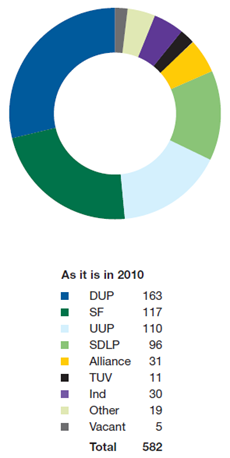Changes in the local arena
Now in its sixth year since the last poll, the local government landscape has slightly altered but not through the usual route of election.
Of the 582 councillors elected five years ago, the DUP topped the poll with 182, 56 ahead of second-placed Sinn Féin. The DUP’s total now sits at 163, largely because of the TUV’s rise, though there has been a subsequent fall in their fortunes and at the time of writing its influence was limited to 11 councillors.
 The trouble has not solely been confined to the DUP, though. Sinn Féin, too, have lost ground. The party is nine councillors short of where it was in 2005.
The trouble has not solely been confined to the DUP, though. Sinn Féin, too, have lost ground. The party is nine councillors short of where it was in 2005.
Banbridge, Newtownabbey and Newry and Mourne now have councillors sitting as independents having left Sinn Féin. Two members sit in an official independent republican capacity in Magherafelt: Oliver Hughes and Eamon Groogan.
Local elections tend to mimic the trends set at a regional level and the usual electoral rules generally do not apply. The current responsibilities of local government here mean that decisions taken by councillors rarely make the local news.
In England and Wales, for example, councillors have some responsibility for housing, education and welfare and are frequently under political party ‘control’. If voters are dissatisfied with a council’s performance, invariably they will change their preference in the next election. No such powers exist in Northern Ireland so voters are rarely faced with questionable decisions by councils.
On the whole, minority parties find their feet at grassroots level and as such it is only in this arena that the TUV, though no councillors were elected as so, are most represented. An unlikely party also has its sole representative in Newry and Mourne District: UKIP’s Henry Reilly.
Alliance have experienced better fortunes. It gained an extra seat since the election as both Billy Webb and Oran Keenan defected to the party, though North Down councillor Ian Parsley left the party to join the Conservatives and sits as the only named Conservative and Unionist councillor in the province.






